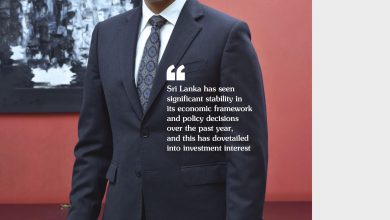INVESTOR MAGNET

Director General Board of Investment of Sri Lanka (BOI)
Sri Lanka’s export oriented industries continue to evolve and attract foreign investments (FDI) across multiple sectors. Manufacturing remains a dominant force, driven by a skilled workforce, strategic location and trade agreements, Renuka Weerakone asserts.
“The trainability of our workforce and their proficiency in English make Sri Lanka an attractive destination for investors. Many foreign companies have operated here for over 40 years, and cite our skilled and loyal workforce as a major factor when continuing to invest in Sri Lanka,” she explains.
Sri Lanka’s FTAs with India, Pakistan, Singapore and Thailand – along with preferential trade schemes such as the EU’s GSP+ and the UK’s Developing Countries Trading Scheme (DCTS) – offer identified sectors with zero duty access to key markets.
She notes that “Sri Lanka’s apparel industry has transformed from small tailoring operations into a hub for high end niche products. Today, 96 percent of apparel exports come from Board of Investment (BOI) companies, and they contributed nearly US$ 4.5 billion to the industry’s 4.7 billion dollar cumulative revenue in 2024.”
The BOI is also fostering investment in auto component manufacturing and pharmaceutical production.
A dedicated pharmaceutical zone in the south is being developed to attract manufacturers, including those producing Active Pharmaceutical Ingredients (API). Similarly, a fabric park established by the BOI in the east will serve as a catalyst in the supply chain for apparel manufacturers.
Tourism is another industry with strong investor confidence. To this end, she points out that “with tourism rebounding and projecting annual revenues of US$ 5 billion this year, there is room for capacity expansion especially outside Colombo.”
“The trainability of our workforce and their proficiency in English make Sri Lanka an attractive destination for investors”

“We are also looking at entertainment and adventure related attractions, such as theme parks, cable cars and marinas to diversify the tourism experience,” she adds.
To mitigate risks for foreign investors, the BOI encourages manufacturers to set up within its export processing zones.
Weerakone explains: “The Board of Investment is not simply a facilitation arm; it also establishes and manages these zones. And within them, the BOI provides building approvals, environmental clearances and Certificates of Conformity (COC), and reduces the complexities of dealing with multiple agencies.”
“Frequent changes in tax policies, levies and trade regulations create uncertainty. To address this, we are advocating for a lock in period of at least five years to ensure that investors operate under consistent conditions,” she reveals.
Policy reforms have long been a focus of the BOI to enhance the ease of doing business in Sri Lanka. Weerakone concedes that “around five years ago, we worked with various agencies to streamline processes; yet, we still face challenges. The BOI was originally a true one-stop shop but after legislative changes in 1992, we lost the authority to grant all approvals under one roof.”
She continues: “Now we rely on multiple agencies, which can slow things down. Investors understand that approvals take time but they expect predictable timelines, which we’re working to improve.”
The BOI has been moving towards digitisation with the introduction of online visa facilitation, customs declarations – including automation of functions at the Central Verification Terminal (CVT) in Orugodawatta – to strengthen transparency and boost efficiency.
“The goal of the board is full digitisation, where applications can reach all relevant agencies simultaneously and receive parallel processing,” Weerakone states.
Despite the challenges, investor confidence remains strong. She reveals: “In January alone, we received 16 applications totalling US$ 189 million. Even during COVID-19, BOI companies continued their operations, exports weren’t interrupted and we made sure that workers received priority vaccinations.”
Looking ahead, Weerakone remains optimistic: “With stability, transparency and a clear road map, we are poised to make Sri Lanka a more attractive investment destination.”





